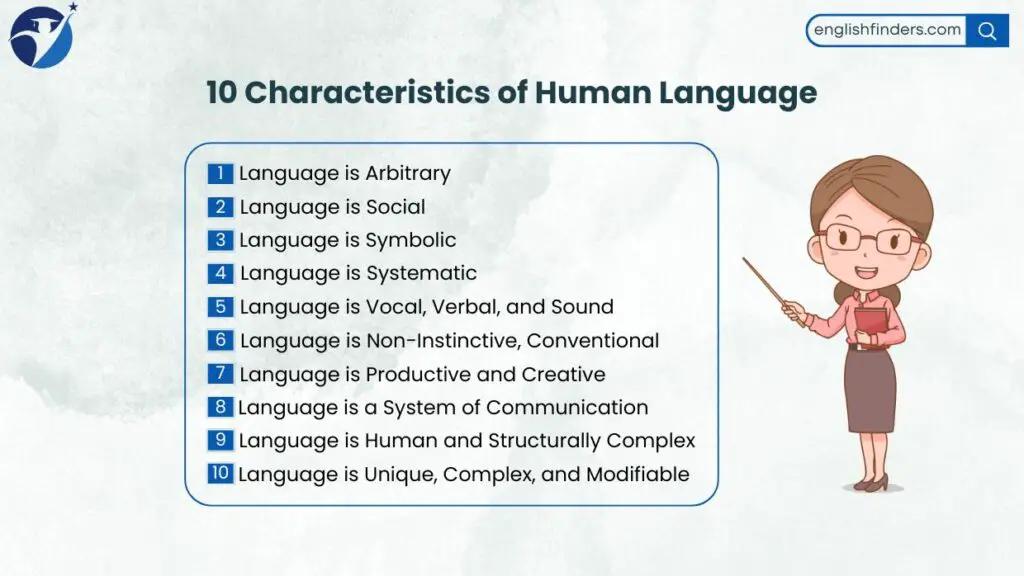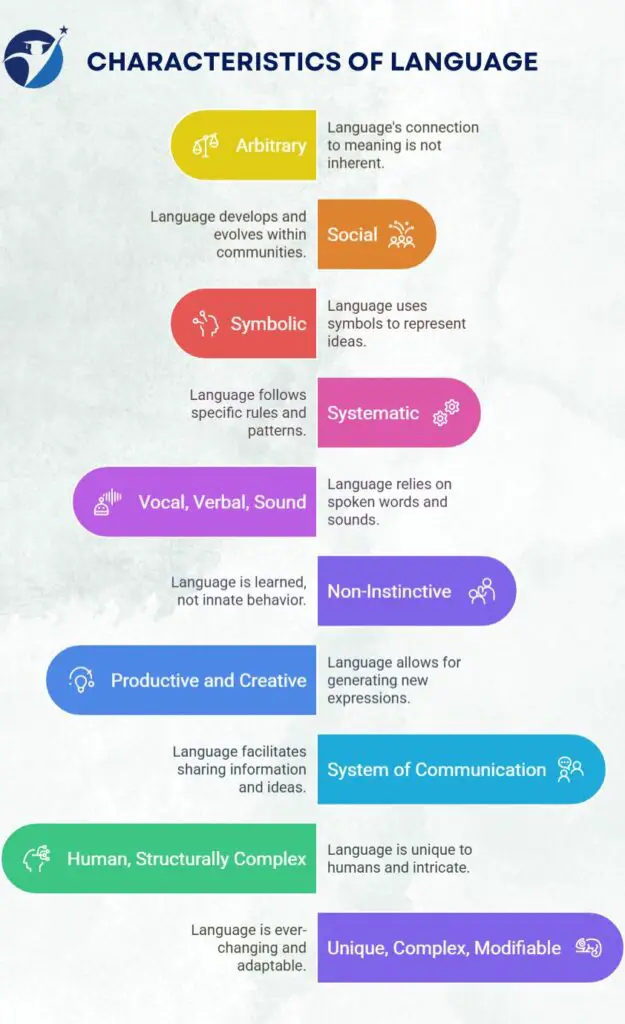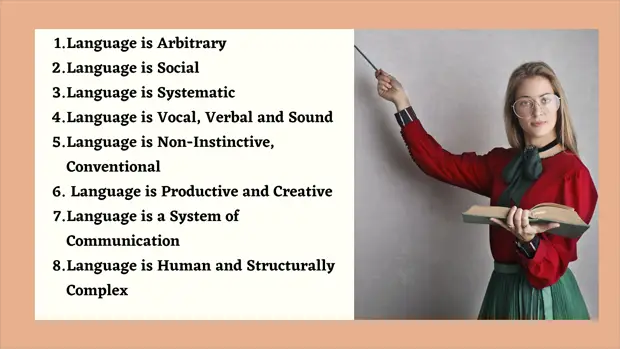Last updated on June 18th, 2025 at 03:06 pm
Language is an essential aspect of our life and it’s also important to learn and understand the characteristics of language. Language is the most powerful and dominant system of communication. In other words, it is the most effective way to communicate.
In addition, language is the system of conventional, spoken, and written symbols by which we communicate with each other, from one country to another country or one culture to another culture. It is the best way to express emotions, thoughts, feelings, and desires.
With time, language is also being changed in its form. Human language is dynamic and adaptable, so it differs from animal communication in several ways. However, every language has some common characteristics and objectives.
Characteristics of Language
Quick Navigation
Let us know the characteristics of language in brief: language is arbitrary, productive, creative, symbolic, systematic, vocalic, social, non-instinctive, and conventional, a system of communication, structurally complex, and adaptable.
10 Major Characteristics of Human Language

Let’s walk you through the ten major characteristics of a language. Please read carefully for proper understanding.
1. Language is Arbitrary
The key and fundamental feature of language is its arbitrariness. This means there is no inherent connection between the words we use and the meanings they represent, proving that language is arbitrary. For example, there is nothing about the sound of the word “tree” that inherently suggests a tall, leafy plant.
Although such items and concepts are expressed, there is no reason different societies should pronounce the “same phrase” differently. Different languages use different sounds to indicate the same object.
It is arbitrary for a term to be used to describe a certain thing or concept. It’s a matter of fact that if language had not been arbitrary, there would have been only one language existing today. We can think of language as an arbitrary vocal symbol because of this.
2. Language is a Social Phenomenon
In a sense, language is a social phenomenon. Language is social in our society; it nourishes and develops culture and establishes human relations.
As a member of a particular social group, we human beings interact with each other, allowing us to identify connect, and coordinate with one another. This is how language is part and parcel of our society.
Sociolinguists study how language varies within different social contexts and how it can be used to assert identity or convey social status. For example, the use of slang and dialects can signal membership in a particular community, while formal languages might be used to convey authority and professionalism.
Language exists in the public arena, is a method for feeding and creating a society, and sets up human relations. As a member of the community, we acquire a language permanently.
3. Language is a Symbolic System
Language signifies a symbolic system consisting of different sound symbols for concepts, things, ideas, objects, etc. It has sounds and words as its symbols.
These symbols are picked and routinely acknowledged and utilized. The words in a language are not just patterns or images but symbols that denote meaning.
The language uses words as symbols, not signs, for the concept they represent. The core value of a language sometimes relies on properly explaining these symbols.
4. Language is Systematic
Although the language is symbolic, its symbols are arranged in specific systems. All languages have their arrangement of plans, and each language is an arrangement of systems.
Furthermore, all languages have phonological and syntactic systems; within a system, several sub-systems exist.
For instance, the morphological and syntactic systems are inside the linguistic system. Inside these two sub-systems, we have systems such as plural, mindset, perspective, tense, etc.
5. Language is Vocal, Verbal, and Sound
Language is a system of vocal and verbal symbolism. It is essentially formed of vocal sounds created by a physiological articulatory component in the human body.
First and foremost, it appears as a vocal sound only. Language uses verbal elements such as sounds, words, and phrases fixed up in specific ways to form several sentences.
Language is vocal and sound, and we can speak a language using different speech organs. Writing can be considered an intelligent platform for representing vocal sounds; it is a graphic representation of the speech sounds of the language.
6. Language is Non-Instinctive, Conventional
No language was produced over a few days using a formula that was accepted by all. Every generation passes on this convention to the one after them as a result of evolution and convention, which gave rise to language.
Languages can evolve, spread, and change just like any other human organization. Every language is spoken in a specific community somewhere in the world. But since language is something we naturally learn, we may say that it is not instinctual.
7. Language is Productive and Creative
Creativity and productivity are integral parts of language. Language is a highly productive system which means it allows us to produce an infinite number of sentences from a finite set of elements. This productivity enables us to express new ideas, describe imaginary words, or convey complex emotions.
In all reality, understanding between the involved individuals is easy. Language can vary by what is required by human society. Language, after all, has the ability to drive productivity and innovation.
8. Language is a System of Communication
Language is strong, convenient, and the best form of communication no doubt, and it is the best way to express everything. We human beings express our thoughts, desires, emotions, and feelings through language.
Further, we can interact easily through the welfare of language. After all, we may say that language is the best communication system in the world.
9. Language is Human and Structurally Complex
One of the major characteristics of language is that it’s human and structurally complex. Unlike animal language, human language is open-minded, extendable, and adaptable. Language should be modifiable from time to time.
No species other than human beings have been endowed with language. So, language is naturally human, structurally complex, and sometimes modifiable.
10. Language is Unique, Complex, and Modifiable
Language is indeed a unique phenomenon in the world. Every language has its characteristics and distinctive features. Furthermore, each language has its own creativity and productivity to deliver the best communication methods.
This is how language has the potential to be unique, complex, and adjustable to the changes in time and culture.

Final Thoughts
Language is a multifaceted and dynamic system that is an integral part of human life. It enables us to communicate, express our thoughts and feelings, and transmit culture. Understanding the characteristics of language gives us insights into not only how we communicate but also how we connect with each other and navigate the world around us.
Frequently Asked Questions
What is the main purpose of language?
The main purpose of language is to facilitate communication, allowing individuals to ideas, emotions, thoughts, and feelings.
How does language differ from other forms of communication?
Language differs from other forms of communication in its complexity, productivity, and ability to convey abstract concepts and ideas through structured symbols and rules.
Why is it important to study the characteristics of language?
Studying the characteristics of language helps us understand the complexities of human communication, the relationship between language and thought, and the ways in which language shapes our social interactions and cultural identity.
Have a look at these useful links:
- Best grammar checker online for free
- Definition of Language
- Stages of Language Development
- What is Psycholinguistics?
- Word Formation Processes

Azizul Hakim is the founder & CEO of englishfinders.com. He is a passionate writer, English instructor, and content creator. He has completed his graduation and post-graduation in English language and literature.





Very good and effective information.
Thank u! Share it more.
Which year is it published
2018.06.29
We’ll need to also talk about language being dynamic for it changes.
Just like people grow, language also grows; where new words are added, and others are improved.
Thanks for your information!
Thanks for the information it helpful
You’re welcome!
Thanks so much
Welcome!
Language is also arbitary,productive,creative, symbolic, system,vocalic and non instinctive..
Human language is a system of vocal auditory communication, interaction with the experiences of it’s user’s employing conventional signs composition of arbitrary patterned sound unit.
Very Convenient information
Thank u!
It is well explained thank you